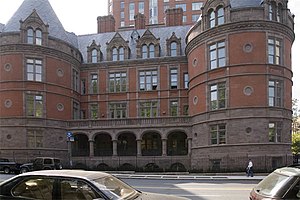Memorial Sloan Kettering Cancer Center

The Memorial Sloan-Kettering Cancer Center (MSKCC) in New York City is a cancer treatment and research institution founded in 1884 as the New York Cancer Hospital. The main campus is located at 1275 York Avenue, between 67th and 68th Streets, with other locations in New Jersey at Basking Ridge, Long Island and Westchester County, New York.
History
MSKCC is actually composed of two intimately-related institutions. Memorial Hospital for Cancer and Allied Diseases, currently led by Physician-In-Chief, Dr. Robert Wittes, provides patient care, whose origins stemmed from a medical laboratory established on the campus of Cornell Medical Center and funded by John D. Rockefeller, in 1900. The original Memorial Hospital building was constructed in 1939 by a group that included John J. Astor and his wife, Charlotte. Between 1970 and 1973 a new memorial hospital was built on the same site - originally donated by John D. Rockefeller, Jr.
Sloan-Kettering Institute, currently led by Dr. Thomas Kelly, is MSKCC's basic-science research arm. The research institute was established in 1945 with a $4 million gift from the foundation of Alfred P. Sloan, Jr. Half the gift was to fund construction of a 13-story research facility and the other half to provide annual operating expenses. Charles F. Kettering, vice president and director of research for General Motors Corporation, was to organize and apply modern American industrial research techniques to cancer research.
In addition to the Sloan grant, a public campaign to raise an additional $3 million to $4 million was undertaken and an important financier who stepped in at a critical juncture was the ongoing supporter Laurance Rockefeller, of the philanthropic Rockefeller family.
At the August 8, 1945 announcement, Sloan and Kettering emphasized that the dramatic news of the atomic bomb, developed with a $2 billion research program, was a graphic illustration of what can be accomplished by scientifically-organized research as practiced by American industry. If as much money and talented personnel were available as the government had for the atomic bomb, they said, very rapid progress could be made in cancer research.
The current president of Memorial Sloan-Kettering is Nobel Prize winner Harold E. Varmus.
Reputation
MSKCC has long been a leader in cancer surgery, chemotherapy, and radiotherapy. It was the first to develop services specifically dedicated to the psychiatric aspects of cancer, to the relief of cancer pain, and to genetic counseling.
U.S. News & World Report ranks MSKCC as the best cancer hospital in the country[2]. Since that particular rating service began, only M. D. Anderson Hospital in Houston has rivaled MSKCC.
Research
MSKCC is affiliated with the Weill Medical College of Cornell University and the Tri-Institutional MD/PhD program, which includes MSKCC as one of its three sites (along with Weill-Cornell and Rockefeller University). MSKCC and Weill-Cornell operate a joint graduate program in biomedical sciences, the Weill Graduate School of Medical Sciences. In 2004, MSKCC also established an independent graduate school, with a Ph.D. program in cancer biology: the Louis V. Gerstner, Jr. Graduate School of Biomedical Sciences. The first class was admitted in July 2006.
MSKCC's new Human Oncology and Pathogenesis Program, based at Memorial Hospital, focuses on translational research, meaning bringing discoveries made in the lab to the patient at the bedside.
Another focus of research at MSKCC is immunotherapy, using the body's own immune system to fight cancer cells. In 2006 the center was one of six institutes (along with research centers at Harvard University, the Massachusetts Institute of Technology, Johns Hopkins University, the University of Chicago, and Stanford University) selected to receive a $20 million grant for cancer research from the Ludwig Fund, created by the American billionaire Daniel K. Ludwig. The grant, one of the largest earmarked for cancer research the hospital has ever received, will be used for immunology research.
Patient Care
There are 437 beds at Memorial Hospital and there were 21,179 patient admissions in 2006. MSKCC opened a new surgical center in the summer of 2006 with 21 operating rooms. Legendary New York pianist George Feyer gave his time regularly for decades to entertain the patients and play at the Center, until just before his death in 2001.
External links
- Official website
- Cancer-help.org - Recent mentions in the online press
- Gerstner Sloan-Kettering Graduate School of Biomedical Sciences
- Cornell/Rockefeller/Sloan Kettering Tri-Institutional MD-PhD Program
- Weill Graduate School of Biomedical Sciences
- MSKCC Marathon Program
- Wikimapia aerial view of Memorial Sloan-Kettering Cancer Center main location in New York City
Sources
- "Sloan, Kettering to Combat Cancer". New York Times. August 8, 1945. p. 1 (cont'd pg 40).
- ^ "Would an Aardvark Live Here?" New York Times, September 17, 2006
- ^ "Best Hospitals 2006: Memorial Sloan-Kettering Cancer Center, New York". U.S. News & World Report. 2006. Retrieved 2007-06-11.
